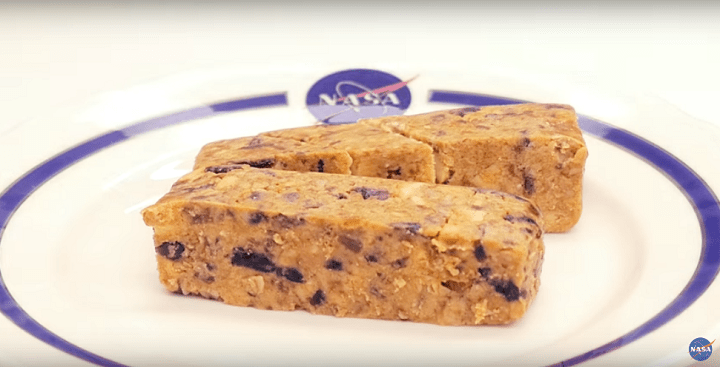Your run-of-the-mill protein bar simply won’t cut it for space travel. NASA food scientists are developing new “food bars” that will act as meal replacements for astronauts on long missions.

The breakfast bars – which feature flavours like banana nut, orange cranberry, ginger vanilla and barbecue nut – are being designed to provide astronauts with nutritional balance, while also increasing caloric density. Each one will weigh in at a whopping 700 to 900 calories.
READ MORE: How does the ISS celebrate American Thanksgiving?
By comparison, a chocolate peanut butter PowerBar Protein Plus bar comes in at 200 calories.
NASA already has a number of tasty nutritional options for breakfast onboard their spacecraft, but these individually packed meals take up a lot of space and end up creating extra weight. The Orion spacecraft, designed to take astronauts to and from Mars eventually, is even more limited in space because flights into deep space won’t have the option to meet with resupply spacecraft to restock supplies and dispose of trash.
READ MORE: U.S. to send people to Mars by 2030s, says Barack Obama
The Orion also needs to be lightweight in order to conserve fuel.
“When you have 700 to 900 calories of something, it’s going to have some mass regardless of what shape it’s in, so we’ve taken a look at how to get some mass savings by reducing how we’re packaging and stowing what the crew would eat for breakfast for early Orion flights with crew,” said Jessica Vos, deputy health and medical technical authority for Orion.
“When you think about multi-week missions in Orion, having just one package for breakfast items for crew will help us limit the space we need to store them.”
According to Takiyah Sirmons, food scientist with Orion, there isn’t a meal replacement or protein bar on the planet that meets the needs of astronauts and spacecraft specifications.
READ MORE: From the moon to Mars—Why is it taking us so long?
“We have some human studies going on that will tell us whether or not people could eat bars every day, or if they need to eat them every five or seven days — or if they don’t like bars at all,” said Sirmons.
Of course, that human testing also involves taste tests – because it’s important that these so-called food bars don’t taste as bad as they might look.
- Ontario First Nation declares state of emergency amid skyrocketing benzene levels
- ‘Sciatica was gone’: hospital performs robot-assisted spinal surgery in Canadian first
- Do Canadians have an appetite for electric vehicles? Experts are divided
- Singh mulls TikTok return as U.S. nears potential ban over security fears
“This one looks like Spam,” Vos said during a video showing the new creations.
A better way to go “number two” in space
We hate to point this out, but all of those food bars have to go somewhere.
At the same time as the Orion crew works on developing better meal solutions, another NASA team is trying to develop a better way to poop in space.
In partnership with crowdsourcing website HeroX, NASA is currently holding a “Space Poop Challenge” which aims to brainstorm more efficient and clean ways for astronauts to do their business.
NASA specifically wants to improve the “in-spacesuit” bathroom experience. Right now, when astronauts wear their full spacesuit they have to rely on diapers in case the urge hits. Astronauts mainly wear their suits during launch or landing, which can last up to 10 hours; however, in the event of an emergency, they could be wearing their suit for up to six days.
NASA hopes the solution will allow astronauts to “collect human waste away from the body without the use of hands,” and will last over 144 hours, or six days.
Should you be able to come up with a viable solution for NASA, you could earn up to $30,000.




Comments